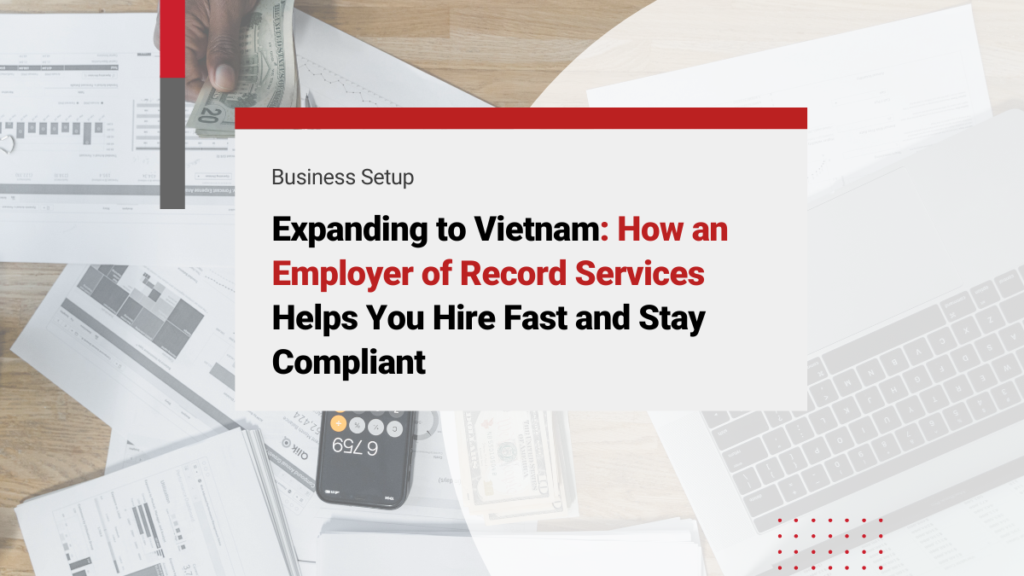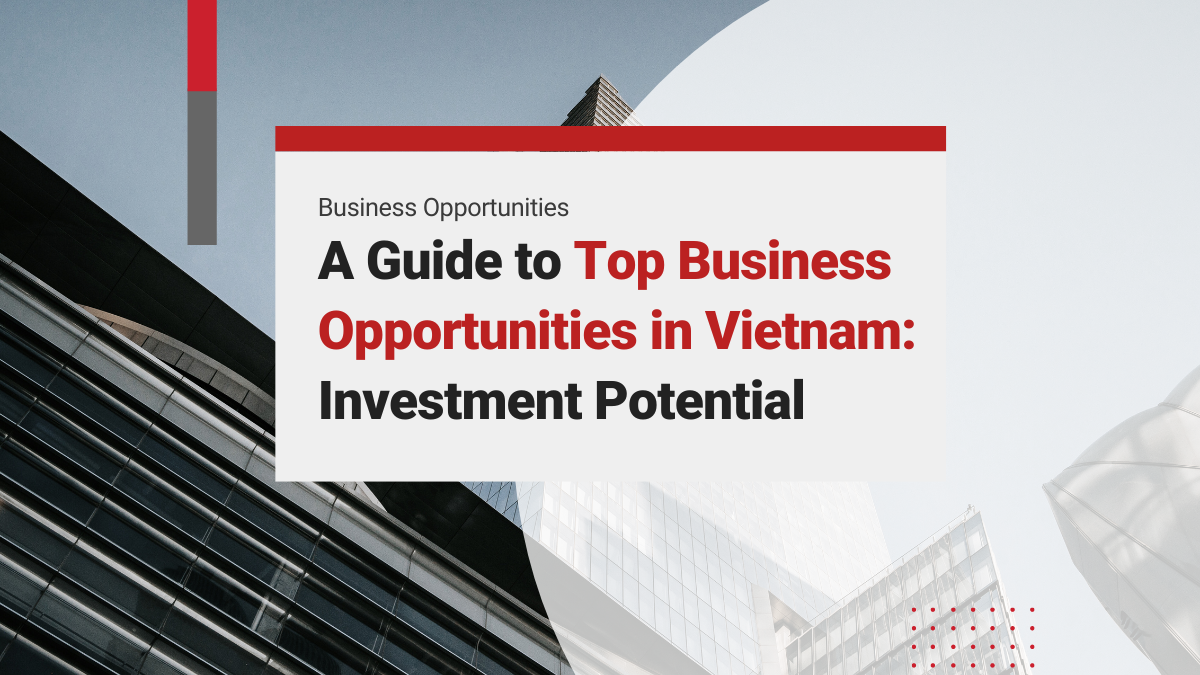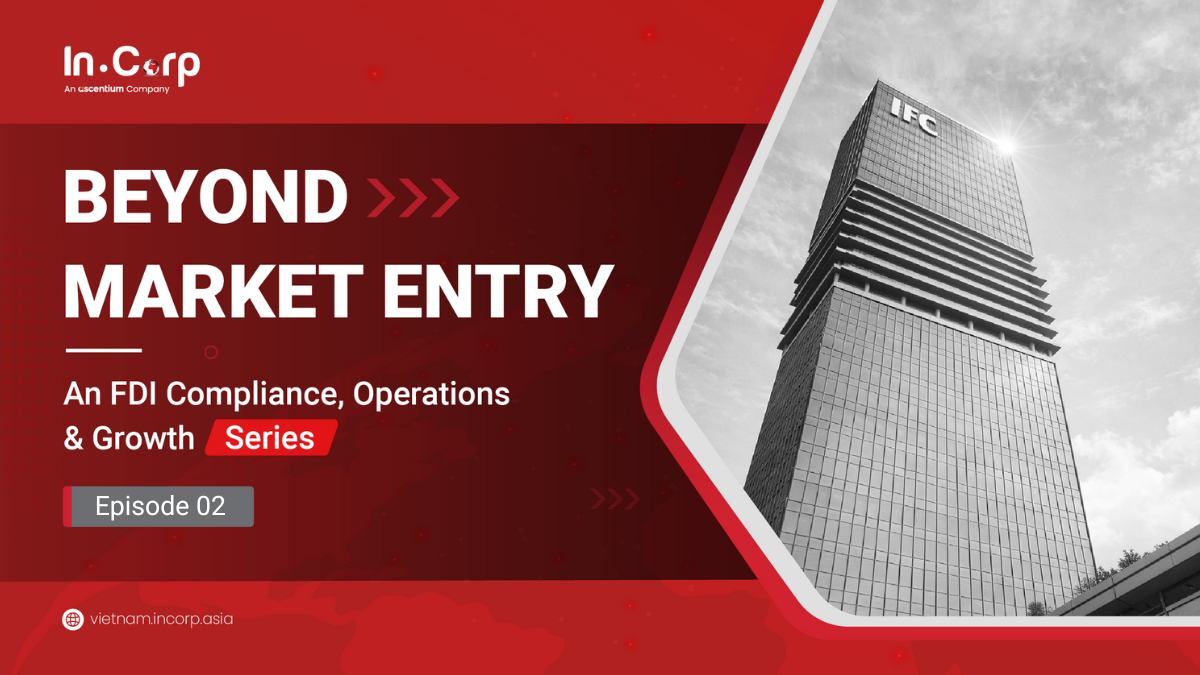Introduction
Vietnam is one of Southeast Asia’s most attractive destinations for foreign investment, thanks to its strong economic growth, large talent pool, and competitive labor costs. With a population of about 98 million and a median age of 32, Vietnam offers a young, skilled, and cost-effective workforce—around 70–80% cheaper than in Western markets. Supportive investment policies and modernized infrastructure have made it even easier for global companies to enter the market.
Yet, expansion can be challenging. Navigating local labor laws, taxes, and administrative procedures often requires setting up a legal entity, which can take months. This is where employer of record services in Vietnam come in. An Employer of Record (EOR) enables businesses to hire Vietnamese professionals quickly and compliantly without establishing a local entity. By partnering with an EOR, companies can streamline market entry, reduce setup costs, and focus on operations while ensuring full compliance with Vietnam’s employment and tax regulations.
Check out InCorp Vietnam’s Employer of Record Services in Vietnam here!
What is an Employer of Record (EOR)?
An Employer of Record (EOR) is a third-party organization that legally employs workers on your company’s behalf in the target country. In Vietnam, this means the EOR hires local employees under its registered entity but assigns them to work for your business. Providers offering employer of record services in Vietnam act as your legal employer, managing all HR, payroll, and compliance functions. While you oversee their daily work and performance, the EOR manages all formal employment duties — from preparing compliant labor contracts and onboarding to handling payroll, tax withholding, and employee benefits. This ensures your operations fully comply with Vietnam’s labor regulations while keeping your management control intact.
In practice, an EOR arrangement functions as a co-employment model: your company directs the employees’ roles and projects, while the EOR handles HR, legal, and payroll compliance. For instance, you set the position, salary, and KPIs, whereas the EOR issues employment contracts, registers employees for social insurance, processes monthly payroll and taxes, and assists with work permit procedures. This setup enables your company to build a local team quickly and compliantly without establishing a legal entity. With employer of record services in Vietnam, businesses can establish teams without going through lengthy entity setup processes.
Benefits of Using an EOR in Vietnam
Using employer of record services in Vietnam provides major advantages for companies expanding into Vietnam.
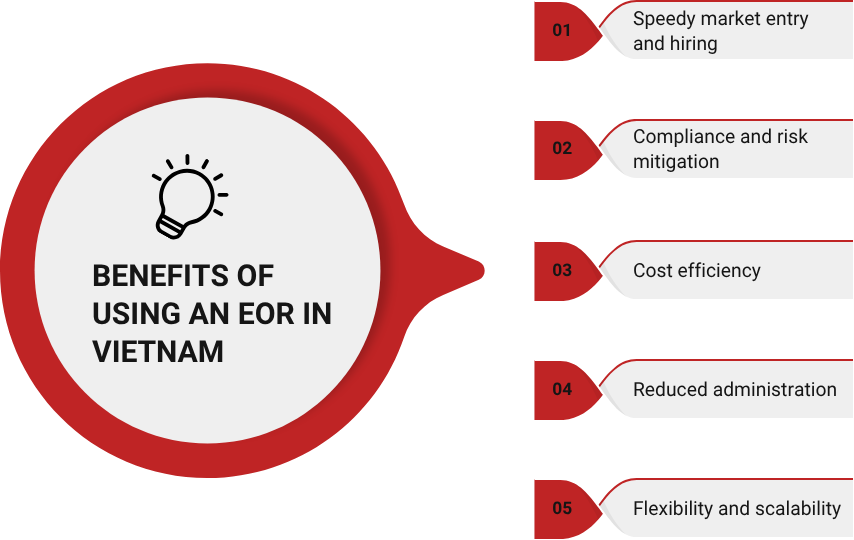
Speedy market entry and hiring
An EOR enables businesses to hire in Vietnam within days instead of months. Setting up a local entity can take 4–6 months and requires multiple licenses, but with an EOR’s established entity, employees can be onboarded in as little as two weeks. This fast setup helps companies capture opportunities quickly in Vietnam’s competitive market. Many firms choose employer of record services in Vietnam to speed up hiring and market entry.
Compliance and risk mitigation
Vietnam’s labor, tax, and social insurance regulations can be complex and frequently updated. EOR providers specialize in compliance, ensuring that contracts, payroll, and taxes fully meet local laws. By handling all regulatory requirements, the EOR protects your business from fines or legal complications, allowing you to focus on operations. With employer of record services in Vietnam, compliance and payroll management are fully localized and stress-free.
Cost efficiency
Establishing a legal entity in Vietnam can cost over USD 40,000 and take months. EOR services, on the other hand, charge a predictable monthly fee per employee, covering all HR and payroll tasks. This eliminates the need for capital investment, local office setup, and ongoing administrative expenses, making EOR a lean, scalable solution for market entry.
Reduced administration
Managing HR and payroll overseas can be time-consuming. With an EOR, all employment-related tasks—such as payroll, taxes, social insurance, and contract renewals—are handled by local experts. This allows your leadership team to focus on strategic goals and business growth instead of administrative work.
Flexibility and scalability
An EOR gives you the agility to adjust headcount based on business needs. Whether hiring project-based staff or expanding your local team, you can scale up or down easily without committing to a permanent entity. This flexibility makes employer of record services ideal for startups and SMEs testing the Vietnamese market before long-term investment.
Vietnam’s Labor Market: Why It’s Attractive
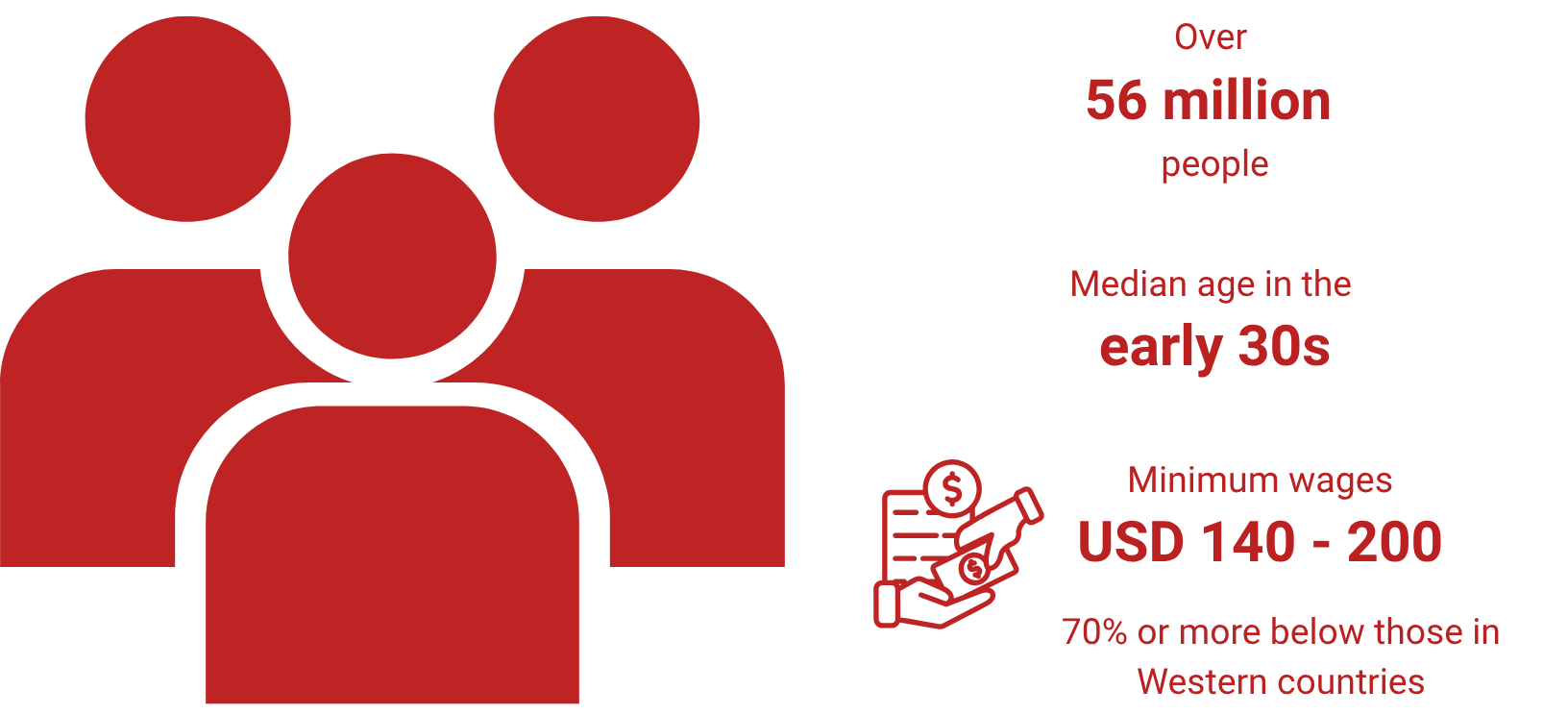
Beyond the operational benefits of using employer of record services, Vietnam itself is an exceptional market for sourcing talent. The country’s fast-growing economy, strong FDI inflows, and government-backed reforms have created a vibrant, cost-efficient labor environment ideal for global employers.
Large, young workforce. Vietnam has a labor force of over 56 million people, with a median age in the early 30s. Each year, thousands of graduates enter the job market from universities and vocational schools specializing in engineering, IT, finance, and manufacturing. This young, educated population offers foreign companies access to adaptable, tech-savvy professionals across multiple industries.
Competitive talent at lower cost. Labor costs in Vietnam are 70% or more below those in Western countries and significantly lower than in China. Minimum wages range from about VND 3.45 million to 4.96 million (USD 140–200) monthly, while office and operational costs remain modest. This affordability allows companies to hire skilled professionals and maintain lean operations, making Vietnam highly attractive for manufacturing, IT outsourcing, and shared service centers. By using employer of record services in Vietnam, you can leverage this cost advantage while maintaining full compliance.
Expanding skilled sectors. Vietnam is evolving from a low-cost production base into a regional hub for high-value manufacturing and services. It ranks among the world’s top apparel exporters and a leading electronics producer. Meanwhile, cities like Ho Chi Minh City and Hanoi are growing technology centers with increasing talent in software, digital marketing, and fintech. This wide skills base supports industries ranging from supply chain and production to creative and digital sectors.
Business-friendly environment. The Vietnamese government continues to promote foreign investment through tax incentives, Special Economic Zones, and free trade agreements. Infrastructure and administrative systems are also improving through digital transformation initiatives that simplify processes like registration and tax filing. These ongoing reforms enhance Vietnam’s position as a stable, investor-friendly destination.
In short, Vietnam combines affordability, skilled talent, and pro-business reforms—making it one of Asia’s most compelling hiring markets. Partnering with an Employer of Record helps your company access this workforce quickly and compliantly, without the delays of establishing a local entity.
Navigating Local Regulations: How EORs Ensure Compliance
Hiring employees abroad often means navigating complex labor laws and administrative rules, and Vietnam is no exception. The country’s detailed labor framework can be difficult to interpret without local expertise. Partnering with an Employer of Record (EOR) helps ensure every part of your hiring process complies with Vietnamese law.
Legal employment setup. Employment contracts in Vietnam must comply with the Labor Code and related regulations. They must include required terms such as job scope, probation, leave, and termination notice, and follow specific rules on contract type and working hours. An EOR prepares and signs these contracts on your behalf, ensuring they remain fully compliant and updated when laws change.
Work permits and visas. Hiring foreign staff in Vietnam requires proper work permits and visas, which involve multiple government steps and documentation. EOR providers manage this process from start to finish — including applications, renewals, and compliance with the latest regulations. Since the EOR is the official employer, it can sponsor your expatriate employees directly, removing the administrative burden from your company.
Payroll, taxes, and social contributions. Vietnam’s payroll system includes mandatory withholdings for personal income tax and contributions to social, health, and unemployment insurance. Reporting is frequent and must be accurate to avoid penalties. The EOR manages payroll processing, filings, and payments to authorities, ensuring employees are paid correctly and all obligations are met without requiring in-house payroll staff. This is a core part of employer of record services in Vietnam, which take over all payroll and tax responsibilities.
Statutory benefits and HR compliance. Vietnamese labor law mandates benefits such as annual leave, maternity leave, and overtime pay, along with strict rules on termination and severance. An EOR ensures compliance with all these provisions, updates your policies as laws evolve, and handles employee exits in line with local regulations. This keeps your business in good standing with both employees and authorities.
Avoiding compliance pitfalls. Many foreign companies struggle with misclassifying workers, late tax filings, or missed social insurance registrations. These mistakes can result in fines or reputational damage. A reliable EOR prevents such issues by managing all employment and compliance matters accurately from day one, giving you peace of mind while you focus on growing your business in Vietnam.
When to Use an EOR: Typical Use Cases
Employer of Record (EOR) services in Vietnam are especially valuable for companies that want to expand into Vietnam quickly, compliantly, and without long-term commitments. Below are common scenarios where using an EOR is the most practical solution.
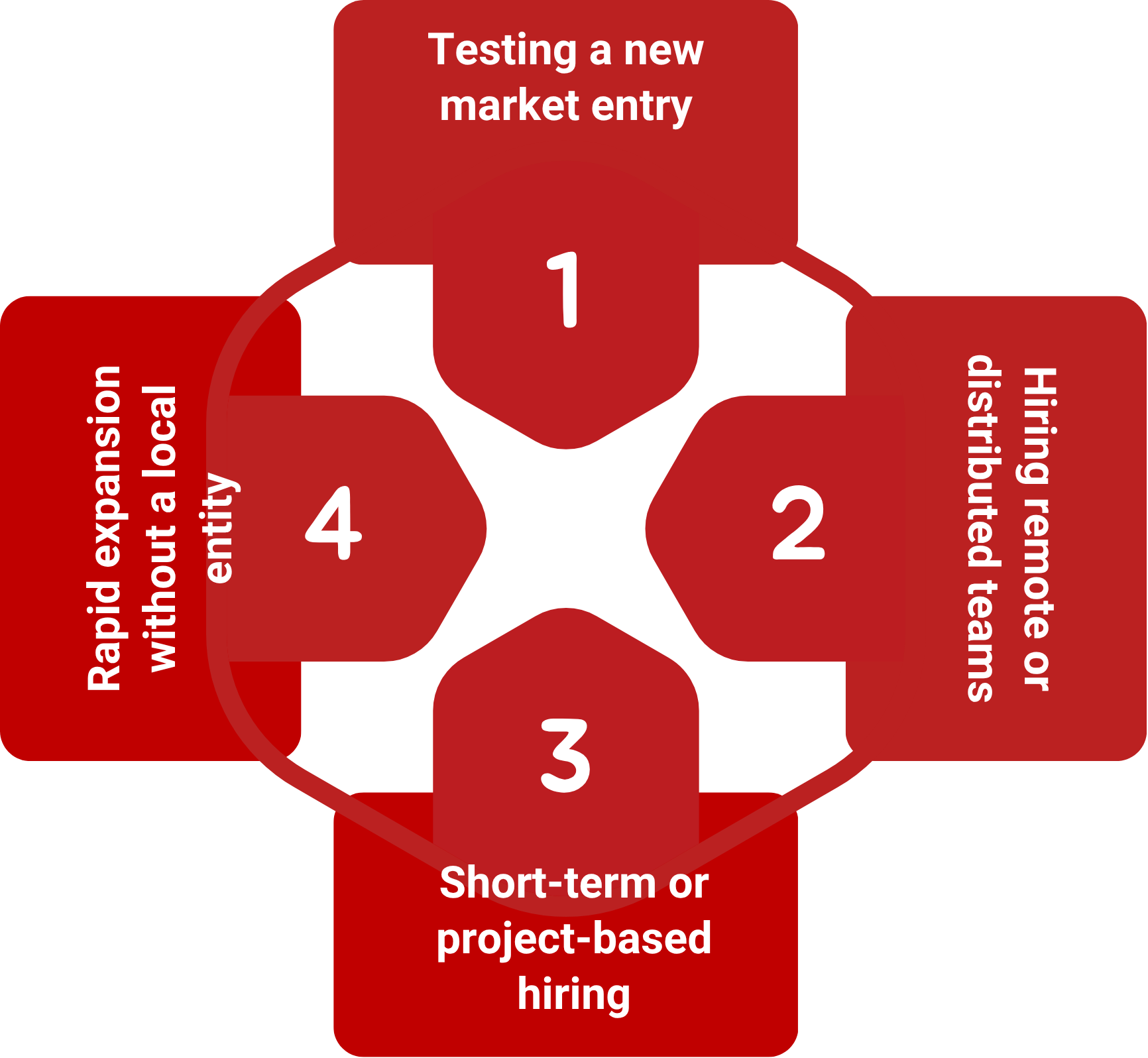
1. Testing a new market entry. For companies exploring Vietnam, setting up a full legal entity can be costly and premature. An EOR allows you to hire a few employees—such as sales representatives, business development managers, or market researchers—to test the market first. This “try before you invest” approach minimizes risk while giving you an immediate local presence to build relationships and assess opportunities. If the market proves promising, you can later transition those employees to your own subsidiary.
2. Hiring remote or distributed teams. Vietnam is a growing hub for skilled remote professionals in IT, design, and customer support. Through an EOR, your overseas company can legally employ Vietnamese talent, even if they work remotely. The EOR manages payroll, taxes, and compliance while you manage performance and projects. This is ideal for companies building offshore development or support teams without establishing a branch office.
3. Short-term or project-based hiring. For temporary projects or contracts, establishing a local entity often doesn’t make financial sense. An EOR allows you to hire technicians, consultants, or other staff in Vietnam for the duration of a project—say, 6 to 12 months—while handling all employment obligations and offboarding at the end. This gives you flexibility and cost control for time-bound engagements.
4. Rapid expansion without a local entity. When new opportunities arise, speed matters. An EOR enables you to hire employees in Vietnam within weeks, even before your local entity is ready. Many companies use EOR services as an interim solution—deploying staff immediately, then transferring them to their own company once it’s established. This ensures you never lose momentum due to administrative delays.
In all these cases, employer of record services in Vietnam offer a fast, low-risk, and compliant path to hiring. Whether you want to test the market, build a remote team, or scale operations quickly, an EOR provides the flexibility to grow at your own pace.
Tips for Choosing a Reliable EOR Partner in Vietnam
Choosing the right Employer of Record (EOR) provider is essential to ensuring a smooth and compliant experience when expanding into Vietnam. Since not all EORs offer the same quality or scope of service, it’s important to evaluate potential partners carefully.
Local expertise and compliance track record. The EOR should have in-depth knowledge of Vietnam’s labor laws and a strong record of compliance. A provider with an established local presence, proper licenses, and proven experience across industries is more likely to navigate complex regulations effectively. Ask how they stay updated on changes to the Labor Code, social insurance, and work permit policies, and how they resolve compliance challenges.
Reputation and references. Choose an EOR with a solid reputation and positive feedback from international clients. Request references or case studies from businesses that have expanded into Vietnam. Speaking directly with existing clients helps you understand the provider’s reliability, responsiveness, and quality of service. A trusted EOR reflects your company’s professionalism and credibility with local employees.
Scope of services and support. Review what’s included in the EOR package. Core services should cover hiring, payroll, tax filing, contract management, and benefits administration. Many providers also assist with onboarding, offboarding, and visa support for expatriates. If your business needs specific arrangements—such as managing remote staff or providing local equipment—confirm that the EOR can handle them. Also check their support model: do they provide a dedicated account manager, and what are their response time commitments?
Transparent pricing. Understand the EOR’s pricing structure before signing. Most charge a per-employee monthly fee or a percentage of payroll, but inclusions can vary widely. A trustworthy EOR will clearly outline what the fee covers—payroll processing, taxes, insurance, and compliance—and identify any extra costs, such as for visa processing or annual tax reports. Clarity on billing and exchange rate handling helps you plan accurately and avoid hidden charges.
Data protection and IP security. Since your EOR will handle sensitive employee data and possibly confidential business information, robust data security is vital. Verify how they protect personal and payroll data, what encryption or security systems they use, and whether their employment contracts include enforceable confidentiality and IP assignment clauses. This is especially critical for companies hiring in technology, R&D, or digital services.
By vetting EOR providers across these criteria, you can find a partner who not only ensures compliance but also supports your business goals in Vietnam. The right EOR acts as an extension of your HR team—handling employment matters professionally while helping your company grow confidently in the Vietnamese market.
Conclusion
Expanding into Vietnam’s vibrant market is an exciting opportunity for foreign companies – and with the help of Employer of Record services, it can be a smooth and swift process. An EOR allows you to tap into Vietnam’s talent pool quickly, without the delays and complexities of setting up a local company. By leveraging an EOR, you gain the ability to hire and onboard Vietnamese professionals in a matter of weeks, confident that all employment matters are handled in full compliance with local laws. This means you can focus on building your team and growing your business in Vietnam, while the EOR takes care of payroll, contracts, taxes, and regulatory filings in the background.
Whether you want to test the waters with a small team, staff a short-term project, or rapidly scale your workforce, the EOR model offers a low-risk, cost-effective route to make it happen. Vietnam’s market offers great promise – and an Employer of Record services in Vietnam can be the key to unlocking it efficiently and compliantly. With the insights from this guide, you can approach Vietnam expansion with a clear understanding of how an EOR works and the value it provides. By choosing a reputable EOR partner and leveraging their local expertise, your company will be well-positioned to hire, operate, and succeed in Vietnam’s dynamic economy.
